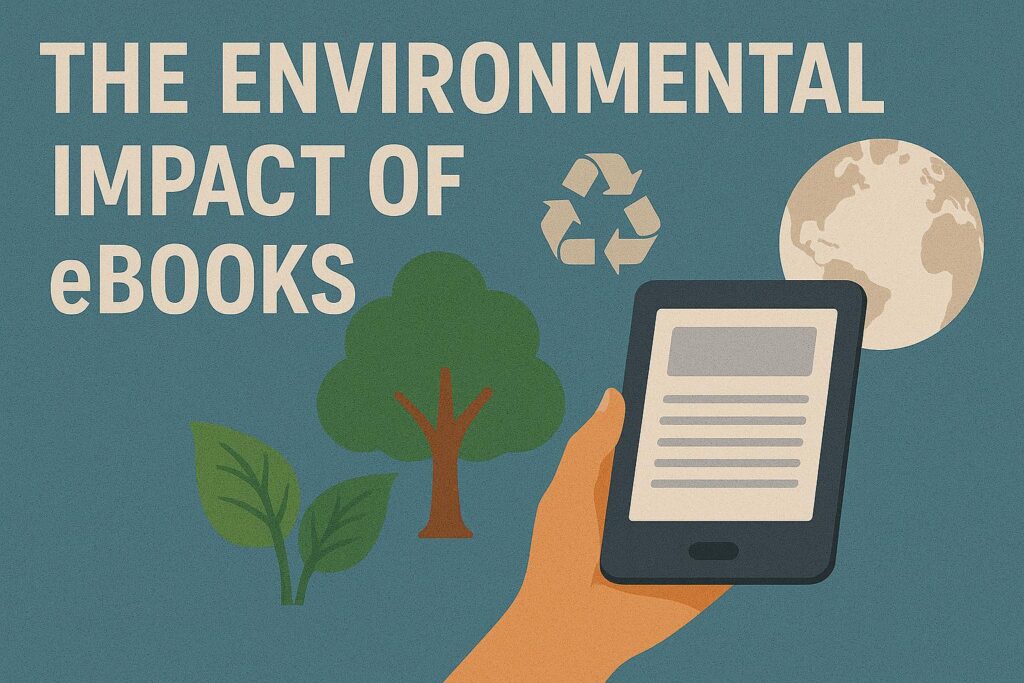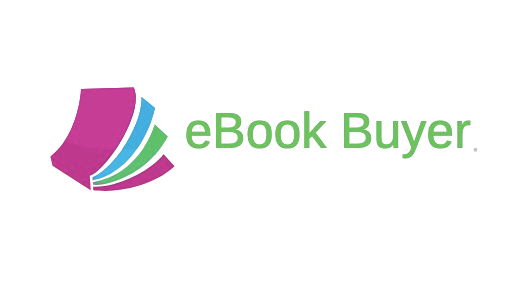The Environmental Impact of eBooks
In a world increasingly focused on sustainability, every choice we make counts—including how we read. Physical books have a timeless charm, but their environmental footprint can be hefty. Enter eBooks: a digital revolution that’s not just convenient and affordable but also a win for the planet.
From saving trees to slashing carbon emissions, eBooks are transforming reading into an eco-friendly habit. At ebookbuyer.com, we’re proud to offer pre-owned eBooks that take sustainability to the next level. Ready to explore how eBooks are helping you read green in 2025? Let’s dive into the environmental impact of eBooks and how you can make a difference with every page you turn.

The Environmental Cost of Physical Books
To appreciate eBooks’ green credentials, let’s first look at the environmental toll of physical books. Producing a single paperback isn’t just about paper—it’s a complex process with a significant ecological footprint.
-
Paper Production: A single book requires about 2–3 kg of paper, and producing one ton of paper consumes roughly 24 trees, 7,000 gallons of water, and 4,000 kWh of energy. Globally, the publishing industry uses millions of tons of paper annually, contributing to deforestation and habitat loss.
-
Printing and Processing: Printing books involves energy-intensive machinery, chemical inks, and binding materials. These processes release volatile organic compounds (VOCs) and other pollutants into the air and water.
-
Transportation: Books are shipped from factories to warehouses to bookstores, burning fossil fuels at every step. A single book’s journey can generate 7.5 kg of CO2 emissions, equivalent to driving 20 miles in a car.
-
Waste: Unsold books are often pulped or landfilled, with millions discarded yearly. Even recycled books require energy to process, and not all components (e.g., glue, laminated covers) are recyclable.
The numbers add up fast. While physical books are cherished, their production and distribution take a toll on forests, water resources, and the climate. This is where eBooks shine as a greener alternative.
How eBooks Reduce Environmental Impact
eBooks eliminate many of the resource-heavy steps involved in physical book production, offering a sustainable way to enjoy literature. Here’s how they make a difference:
1. No Paper, No Trees
eBooks are entirely digital, requiring no paper or physical materials. By choosing an eBook over a paperback, you’re saving trees and reducing the demand for logging. For example, if one million readers switch to eBooks for just one title, that’s 2–3 million kg of paper saved—equivalent to preserving 50,000 trees!
2. Zero Transportation Emissions
Unlike physical books, eBooks are downloaded instantly, bypassing the need for shipping trucks, planes, or delivery vans. This cuts CO2 emissions to near zero for distribution. Whether you’re reading in New York or New Delhi, your eBook arrives in seconds without burning a drop of fuel.
3. Minimal Energy Use
Reading an eBook requires a device (e.g., eReader, tablet), which uses electricity. However, the energy footprint is tiny compared to book production. Studies estimate that an eReader’s lifetime energy use (including charging) is equivalent to the CO2 emissions of just 10–20 physical books. Once you own a device, each eBook you read adds negligible environmental impact.
4. No Waste from Unsold Copies
Physical books often end up in landfills if they don’t sell, but eBooks exist only as digital files. There’s no overproduction, no pulping, and no waste. Platforms like ebookbuyer.com take this further by offering pre-owned eBooks, extending the life of digital files and reducing the need for new downloads.
5. Support for Sustainable Practices
Many eBook platforms use cloud servers powered by renewable energy, further lowering their carbon footprint. By choosing eBooks from eco-conscious marketplaces like ebookbuyer.com, you’re supporting a digital ecosystem that prioritizes sustainability.
The Role of Pre-Owned eBooks in Sustainability
Buying pre-owned eBooks, like those available on ebookbuyer.com, amplifies the environmental benefits of digital reading. Here’s why:
-
Extending Digital Lifecycles: Pre-owned eBooks give existing files a second life, reducing the demand for new eBook production and server storage. It’s like recycling, but for digital content.
-
Reducing Redundant Downloads: When you buy a pre-owned eBook, you’re reusing a file that’s already been created, minimizing energy use on cloud servers.
-
Encouraging Circular Reading: Selling your unused eBooks on ebookbuyer.com keeps them in circulation, ensuring they reach new readers without additional environmental cost.
By choosing pre-owned eBooks, you’re not just saving money—you’re making a conscious choice to read greener. It’s a small action with a big impact, especially when millions of readers join in.
Challenges and Considerations
While eBooks are undeniably eco-friendly, they’re not perfect. It’s worth addressing a few challenges to get the full picture:
-
Device Production: Manufacturing eReaders and tablets requires mining rare earth metals, energy, and water. However, the environmental cost of one device is offset after reading just a few eBooks compared to physical books. To maximize sustainability, use your device for as long as possible before upgrading.
-
Energy Consumption: Charging devices and running cloud servers uses electricity, which may come from fossil fuels in some regions. Opt for energy-efficient eReaders (e.g., e-ink models) and charge with renewable energy sources when possible.
-
Digital Waste: While eBooks don’t create physical waste, old devices can end up in landfills if not recycled. Always recycle your eReader or tablet at an e-waste facility to minimize harm.
These challenges are minor compared to physical books’ footprint, and with mindful habits, you can make eBooks even greener.
How You Can Read Greener with eBooks
Ready to make your reading habits more sustainable? Here are five actionable tips to maximize the environmental benefits of eBooks:
-
Switch to eBooks for Most Reads: Reserve physical books for special editions or gifts, and choose eBooks for everyday reading. Explore affordable pre-owned eBooks on ebookbuyer.com to start your green journey.
-
Buy Pre-Owned eBooks: Opt for second-hand digital files to reduce server energy use. ebookbuyer.com’s marketplace makes it easy to find eco-friendly titles at budget-friendly prices.
-
Sell Unused eBooks: Declutter your digital library by selling eBooks you’ve finished. Platforms like ebookbuyer.com let you earn cash while keeping digital files in circulation, reducing waste.
-
Use Energy-Efficient Devices: Choose e-ink eReaders like the Kindle Paperwhite or Kobo Clara, which use less power than tablets. Charge with solar chargers or renewable energy for extra eco points.
-
Recycle Old Devices: When upgrading your eReader, recycle your old device at a certified e-waste center. Many retailers offer trade-in programs to make this easy.
Example: If you read 20 eBooks a year on an e-ink eReader, you could save 150 kg of CO2, 60 trees, and thousands of gallons of water compared to physical books. Add pre-owned eBooks from ebookbuyer.com, and your impact grows even greener!
The Bigger Picture: eBooks and a Sustainable Future
The shift to eBooks is part of a broader movement toward sustainability. In 2025, with climate change a pressing concern, digital reading aligns with global efforts to reduce resource use and emissions. By choosing eBooks, you’re joining millions of readers who are rethinking consumption—one book at a time. Platforms like ebookbuyer.com amplify this impact by making sustainable reading affordable and accessible, ensuring that eco-friendly choices don’t break the bank.
Beyond individual actions, eBooks support a circular economy. Authors can publish digitally without printing costs, readers can access global libraries instantly, and pre-owned marketplaces keep digital content alive. It’s a win for the planet, creators, and book lovers alike.
Conclusion
eBooks are more than a convenient way to read—they’re a powerful tool for sustainability. By eliminating paper, transportation, and waste, eBooks drastically reduce the environmental footprint of reading. Pre-owned eBooks, like those on ebookbuyer.com, take it a step further, promoting a circular reading culture that’s kind to both your wallet and the planet.
With mindful habits like choosing energy-efficient devices, recycling eReaders, and selling unused eBooks, you can make every read a green one. Start embracing the environmental benefits of eBooks today, and let’s build a greener future, one digital page at a time.
